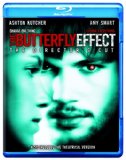| Reviews & Columns |
|
Reviews DVD TV on DVD Blu-ray 4K UHD International DVDs In Theaters Reviews by Studio Video Games Features Collector Series DVDs Easter Egg Database Interviews DVD Talk Radio Feature Articles Columns Anime Talk DVD Savant Horror DVDs The M.O.D. Squad Art House HD Talk Silent DVD
|
DVD Talk Forum |
|
|
| Resources |
|
DVD Price Search Customer Service #'s RCE Info Links |
|
Columns
|
|
|
Butterfly Effect: Director's & Theatrical Cut, The
New Line // R // July 17, 2012
List Price: $19.98 [Buy now and save at Amazon]
The Film:
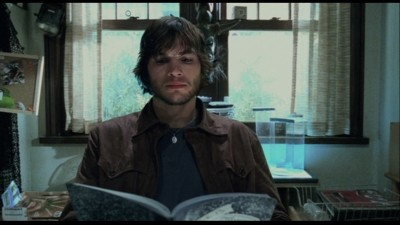 "Just think of your mind as a movie: you can pause, rewind or slow down any details you want."
"Just think of your mind as a movie: you can pause, rewind or slow down any details you want."
So says a hypnotherapist in The Butterfly Effect, Eric Bress and J. Mackye Gruber's fantasy suspense film about tapping into the dark spaces of repressed memories as a way of altering the past. The central idea behind the title -- and its effects on the future -- has been explored ad-nauseum in many different forms, ultimately arriving at a unified idea that even small changes, no matter how righteous on the surface, could lead to dangerous and unpredictable side effects. Caution goes out the window when one can heal old scars, I suppose. The Butterfly Effect's focus on the "chaos" of the Chaos Theory compels enough in its zany overdramatic framework, explored in a provocative temporal thriller that observes what happens when someone tampers with the context of the mind's footage. That domino effect, and the thematic tension that follows, outweighs the merely tolerable performance values and stretches in logic, succeeding as a hectic and brisk-moving metaphysical puzzle with a little toe-dipping in the pool of deeper thought.
Ashton Kutcher (No Strings Attached, That '70s Show) takes his first real stab at a non-comedic role here as Evan Treborn, a college psych student who's suffered from memory blackouts since childhood. To combat his condition and potentially jog his mind, he's kept journals ever since one of his childhood incidents. Whether his blackouts are good thing or not is debatable, but it's had one positive outcome: he can't remember several psychologically-damaging events that occurred in his youth, many of which revolve around his friend Kayleigh and her brother Tommy. They've distanced themselves from one another over the years, yet Evan feels compelled to return to his hometown and rebuild his kinship with the now-grown, down-and-out Kayleigh (Amy Smart, Mirrors) after he experiences a strangely realistic phenomenon while reading one of his journals. He discovers that revisiting his memories through his writing creates an actual space where he can not only relive what he's blacked out, but can interact with -- and change -- what's happened. And once tragedy strikes his life, his hand is forced to take it a step further.
The Butterfly Effect covers the early moments in Evan's life for roughly the first half hour of the film, creating a "control" version of his experiences -- from his troubling days with Kayleigh and Tommy's father (Eric Stoltz, Caprica) to the times when they're cigarette-wielding barely-teens -- as a reference point for the story's metastasizing purposes. I refer to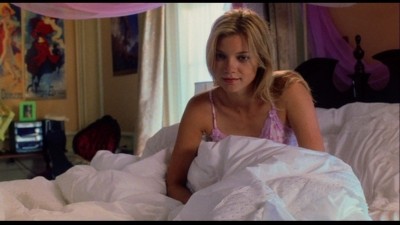 Evan's history on obligatory, serviceable terms because the drama created in his early experiences isn't convincing enough to stand on its own; there's a slimy, ham-fisted air about scenes with Kayleigh's abusive father, shot in a exaggerated gritty aesthetic to really hammer home the point, while the kids' teenage years hinge on forced melodramatic occurrences of violence and family woes. Even Evan's mother doesn't come away unscathed, as Big Love and P.T. Anderson darling Melora Waters feels atypically stiff and unnatural. These scenes will become important in Bress and Gruber's grand scheme of a script and they're sturdily-performed enough to get their thematic point across, but they neglect to fully create an authentic emotional foundation for adult-aged Evan.
Evan's history on obligatory, serviceable terms because the drama created in his early experiences isn't convincing enough to stand on its own; there's a slimy, ham-fisted air about scenes with Kayleigh's abusive father, shot in a exaggerated gritty aesthetic to really hammer home the point, while the kids' teenage years hinge on forced melodramatic occurrences of violence and family woes. Even Evan's mother doesn't come away unscathed, as Big Love and P.T. Anderson darling Melora Waters feels atypically stiff and unnatural. These scenes will become important in Bress and Gruber's grand scheme of a script and they're sturdily-performed enough to get their thematic point across, but they neglect to fully create an authentic emotional foundation for adult-aged Evan.
Once Evan hops into the harrowing maze of his journals and carries out his first deliberate memory alteration, creating an alternate version of his life hinges on that change, The Butterfly Effect takes flight as a hyper-stylized, stimulating metaphysical thriller in the vein of a lengthy Twilight Zone episode. Bress and Gruber plunge headlong into chaotic ideas and heavy emotional button-pushing as Evan's contorted mind bounces from reality to reality, which sees Evan himself -- as well as his college life, his friends, and his mother -- capriciously morphing in the new fabric of his reality. Evan's memories become a template for our awareness of what's going on within the concept-heavy writing; he either prevents or thwarts tragic events around Kayleigh and Tommy that attempt to shape the future into something more appealing, punctuated by manipulated photography and acute musical heaviness. Upon the moment when Evan's wakes up from each crack at a new life, there's a hint of anticipation and morbid curiosity in seeing where his desperate inclinations have brought his damaged path to next.
What's surprising about The Butterfly Effect is the emotional core it creates around Evan's desire to change the future, his anxiety to improve things in order to create a life worth living for his star-crossed love Kayleigh. Kutcher's performance as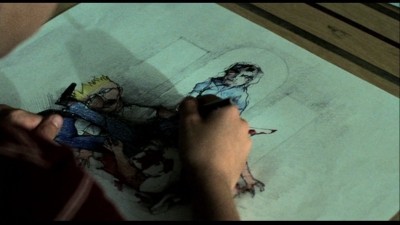 Evan meets his side of the bargain in one of the actor's better performances; his tall, scraggly Evan shoots out emblazoned glances and frenzied emotions as the desperation mounts. Yet, it's the quaint, disarming honesty of Amy Smart's various incarnations of Kayleigh that becomes the emotional cornerstone, offering an entity worth protecting in the whirlwind of Evan's time-meddling. Slightly different versions of herself emerge in each of Evan realities, and the self-aware shifts in Smart's mannerisms make each one at least moderately convincing. There are moments where you'll be heavily tempted to groan or roll your eyes at the way things have played out in the new scenarios, but with one of Smart's familiarly warm smirks or painful glances, she anchors things back down to relative authenticity.
Evan meets his side of the bargain in one of the actor's better performances; his tall, scraggly Evan shoots out emblazoned glances and frenzied emotions as the desperation mounts. Yet, it's the quaint, disarming honesty of Amy Smart's various incarnations of Kayleigh that becomes the emotional cornerstone, offering an entity worth protecting in the whirlwind of Evan's time-meddling. Slightly different versions of herself emerge in each of Evan realities, and the self-aware shifts in Smart's mannerisms make each one at least moderately convincing. There are moments where you'll be heavily tempted to groan or roll your eyes at the way things have played out in the new scenarios, but with one of Smart's familiarly warm smirks or painful glances, she anchors things back down to relative authenticity.
It's best to take Bress and Gruber at their word with The Butterfly Effect's perception of reality though, because the film treads on thin, murky water if it's inspected too far under the surface. At a glance, Evan's marathon through realities presents a thought-teasing exercise of fantastical shock-value melodrama; watching how his life contorts with each preventative decision, veering from the absurdly good to the exceptionally downtrodden, turns into a barrage of exaggerated dramatic jabs with an exhilarating reality-bending undercurrent. Pausing to contemplate the nitty-gritty of each reality, however, such as whether the changes stay true to the threshold of the characters' inborn types or whether each version of Evan would even experience the same events in his past to manipulate, becomes an exercise of frustration and doubt that buckles under the weight of implausibility. That type of writing relies on black-and-white extremes, which only works on the surface while moving towards the film's purpose-driven, nihilistic finale (referencing the intended, superior director's cut conclusion). Despite that, while running on emotional fumes and fantastical curiosity, it crosses the finish line with its ambitious purposes still firmly clenched in its grasp.
The Blu-ray:
The Butterfly Effect arrives from New Line Home Entertainment in a single-disc, standard Blu-ray presentation, with both the Theatrical Cut and the Director's Cut piled onto the same disc. The key difference between the two lies in the conclusion, and it's quite clear that the darker, more unsettling ending of the director's cut remains the filmmakers' objective from the moment we first read the Chaos Theory quote at the movie's beginning. Still, for those who favor the theatrical ending, it's a plus to have both made available, and without a compromise in quality.
Video and Audio:
New Line Home Video were beaten to the punch by Canada's Alliance Films in releasing a Blu-ray of The Butterfly Effect, so it's up to WB's sister label to best that previous high-definition presentation. It does, but not so much in the visual department: the 1.78:1 1080p treatment shares a lot of similarities to its Canadian counterpart in presenting the high-contrast, intensely-manipulated palette, barely edging it out in refinement, color confidence, and fine detail. Heaviness permeates the film's style that makes it tough to pinpoint what's intentional from scene to scene, but all the home-video presentations share elements -- some hazy dream-like scenes, muddy grain, and punchy contrast -- that have been preserved in this HD presentation. Some scenes sport impressive details and vibrant color, others are muddled and flat, but it feels appropriate in terms of its aesthetic. The advancements mostly stem from a finicky technical standpoint; less compression noise and a more fluid representation of contours wins the day, while the master itself, albeit a shade darker than the Canadian release, sports less overall damage.
The real treat comes in the audio. New Line Home Entertainment sprinted beyond the previous sonic presentations of The Butterfly Effect with an aggressive 6-channel Master Audio track. The key sound advancement can be heard in the loud, furious transitions between the real world and Evan's memories; vigorous, punchy activity rumbles during the ferocious thrust of bass and middle-range fervor during those slips of consciousness, while the shaking and rattling of Evan's environments while he's reading his journal really telegraph a punch. Sputtering fire, the slamming of jail cell doors, the clank of a wooden spoon on a metal bowl and even the movement of ice in a glass of liquor also achieve heightened clarity and a natural awareness of the soundstage's threshold. Even verbal clarity receives a significant boost, ridding itself of any thin or metallic-sounding effects that could hamper it. Aside from a few mediocre sound elements feeling slightly muffled, it's a solid, impressive aural presentation from New Line.
Special Features:
New Line Home Entertainment have repurposed most of the special features from the Infinifilm DVD presentation of The Butterfly Effect for this release, a somewhat substantial slate of features that focuses on both the film's theorization and the creative process in getting the film made. Front and center, we've got the Director's Cut Commentary with Bress and Gruber, which hits on the difficulties of getting their film made and how the home-video format has made it possible for them to bring their full vision to their audience. They discuss photographic techniques used that hearken back to Hitchcock, the audition process in finding the right "insane" young Evan, and tons of easter eggs scattered across the film: Eric Stoltz' wig, Kutcher handling worms, and other fun movie-making buts. And, of course, they discuss their original ending, which is where the filmmakers reveal a sense of relief and pride. In addition to that, the subtitle-driven Fact Track has also been preserved for this release.
Alongside those tracks, we've also got a handful of featurettes in the Beyond the Film section of the disc. Two of the pieces focus on the theories and science present in The Butterfly Effect: The Science and Psychology of the Chaos Theory (8:57, SD) and The History and Allure of Time Travel (13:23, SD), both of which offer brief but insightful glimpses into the concept's general basis in conjecture. The other two takes us deeper into the filmmakers' workspace; The Creative Process (17:47, SD) offers a behind-the-camera look at how Bress and Gruber conceived and executed their production, while Behind the F/X (16:04, SD) reveals how both bold and sly digital effects slip into the picture. Fleshing out the rest of the film-centric features, we've also got twelve Storyboard sequences and a slate of Deleted Scenes with Optional Commentary (6:33, SD), several of which are additional alternate takes on the theatrical ending. Finally, we've got a fairly spoiler-heavy but intriguing Theatrical Trailer (2:33, HD).
Final Thoughts:
Eric Bress and J. Mackye Gruber had to fight tooth-and-nail to get The Butterfly Effect made, but ultimately their diligence paid off by constructing this complicated, fast-moving psychological fantasy-thriller about one man's drive to alter his tumultuous past. Barring some meager emotional development in the drama-centered portions of Evan Treborn's life, the concept of fate spiraling out of control when it's manipulated creates an exhilarating space for Twilight Zone-caliber suspense and dystopian eeriness. It provokes a few questions of the audience as well, mostly about the futility of attempting to change one's fate, but it's best to absorb the momentum and bizarre, breakneck shifts in reality than to contemplate the feasibility too closely. New Line Home Entertainment's Blu-ray presentation dishes out a respectable visual transfer and a shocking hard-hitting aural track, all while preserving the commentary, deleted scenes, and featurettes from the original DVD. Very strongly Recommended, and a no-brainer at the low entry price.
Thomas Spurlin, Staff Reviewer -- DVDTalk Reviews | Personal Blog/Site
 "Just think of your mind as a movie: you can pause, rewind or slow down any details you want."
"Just think of your mind as a movie: you can pause, rewind or slow down any details you want." So says a hypnotherapist in The Butterfly Effect, Eric Bress and J. Mackye Gruber's fantasy suspense film about tapping into the dark spaces of repressed memories as a way of altering the past. The central idea behind the title -- and its effects on the future -- has been explored ad-nauseum in many different forms, ultimately arriving at a unified idea that even small changes, no matter how righteous on the surface, could lead to dangerous and unpredictable side effects. Caution goes out the window when one can heal old scars, I suppose. The Butterfly Effect's focus on the "chaos" of the Chaos Theory compels enough in its zany overdramatic framework, explored in a provocative temporal thriller that observes what happens when someone tampers with the context of the mind's footage. That domino effect, and the thematic tension that follows, outweighs the merely tolerable performance values and stretches in logic, succeeding as a hectic and brisk-moving metaphysical puzzle with a little toe-dipping in the pool of deeper thought.
Ashton Kutcher (No Strings Attached, That '70s Show) takes his first real stab at a non-comedic role here as Evan Treborn, a college psych student who's suffered from memory blackouts since childhood. To combat his condition and potentially jog his mind, he's kept journals ever since one of his childhood incidents. Whether his blackouts are good thing or not is debatable, but it's had one positive outcome: he can't remember several psychologically-damaging events that occurred in his youth, many of which revolve around his friend Kayleigh and her brother Tommy. They've distanced themselves from one another over the years, yet Evan feels compelled to return to his hometown and rebuild his kinship with the now-grown, down-and-out Kayleigh (Amy Smart, Mirrors) after he experiences a strangely realistic phenomenon while reading one of his journals. He discovers that revisiting his memories through his writing creates an actual space where he can not only relive what he's blacked out, but can interact with -- and change -- what's happened. And once tragedy strikes his life, his hand is forced to take it a step further.
The Butterfly Effect covers the early moments in Evan's life for roughly the first half hour of the film, creating a "control" version of his experiences -- from his troubling days with Kayleigh and Tommy's father (Eric Stoltz, Caprica) to the times when they're cigarette-wielding barely-teens -- as a reference point for the story's metastasizing purposes. I refer to
 Evan's history on obligatory, serviceable terms because the drama created in his early experiences isn't convincing enough to stand on its own; there's a slimy, ham-fisted air about scenes with Kayleigh's abusive father, shot in a exaggerated gritty aesthetic to really hammer home the point, while the kids' teenage years hinge on forced melodramatic occurrences of violence and family woes. Even Evan's mother doesn't come away unscathed, as Big Love and P.T. Anderson darling Melora Waters feels atypically stiff and unnatural. These scenes will become important in Bress and Gruber's grand scheme of a script and they're sturdily-performed enough to get their thematic point across, but they neglect to fully create an authentic emotional foundation for adult-aged Evan.
Evan's history on obligatory, serviceable terms because the drama created in his early experiences isn't convincing enough to stand on its own; there's a slimy, ham-fisted air about scenes with Kayleigh's abusive father, shot in a exaggerated gritty aesthetic to really hammer home the point, while the kids' teenage years hinge on forced melodramatic occurrences of violence and family woes. Even Evan's mother doesn't come away unscathed, as Big Love and P.T. Anderson darling Melora Waters feels atypically stiff and unnatural. These scenes will become important in Bress and Gruber's grand scheme of a script and they're sturdily-performed enough to get their thematic point across, but they neglect to fully create an authentic emotional foundation for adult-aged Evan. Once Evan hops into the harrowing maze of his journals and carries out his first deliberate memory alteration, creating an alternate version of his life hinges on that change, The Butterfly Effect takes flight as a hyper-stylized, stimulating metaphysical thriller in the vein of a lengthy Twilight Zone episode. Bress and Gruber plunge headlong into chaotic ideas and heavy emotional button-pushing as Evan's contorted mind bounces from reality to reality, which sees Evan himself -- as well as his college life, his friends, and his mother -- capriciously morphing in the new fabric of his reality. Evan's memories become a template for our awareness of what's going on within the concept-heavy writing; he either prevents or thwarts tragic events around Kayleigh and Tommy that attempt to shape the future into something more appealing, punctuated by manipulated photography and acute musical heaviness. Upon the moment when Evan's wakes up from each crack at a new life, there's a hint of anticipation and morbid curiosity in seeing where his desperate inclinations have brought his damaged path to next.
What's surprising about The Butterfly Effect is the emotional core it creates around Evan's desire to change the future, his anxiety to improve things in order to create a life worth living for his star-crossed love Kayleigh. Kutcher's performance as
 Evan meets his side of the bargain in one of the actor's better performances; his tall, scraggly Evan shoots out emblazoned glances and frenzied emotions as the desperation mounts. Yet, it's the quaint, disarming honesty of Amy Smart's various incarnations of Kayleigh that becomes the emotional cornerstone, offering an entity worth protecting in the whirlwind of Evan's time-meddling. Slightly different versions of herself emerge in each of Evan realities, and the self-aware shifts in Smart's mannerisms make each one at least moderately convincing. There are moments where you'll be heavily tempted to groan or roll your eyes at the way things have played out in the new scenarios, but with one of Smart's familiarly warm smirks or painful glances, she anchors things back down to relative authenticity.
Evan meets his side of the bargain in one of the actor's better performances; his tall, scraggly Evan shoots out emblazoned glances and frenzied emotions as the desperation mounts. Yet, it's the quaint, disarming honesty of Amy Smart's various incarnations of Kayleigh that becomes the emotional cornerstone, offering an entity worth protecting in the whirlwind of Evan's time-meddling. Slightly different versions of herself emerge in each of Evan realities, and the self-aware shifts in Smart's mannerisms make each one at least moderately convincing. There are moments where you'll be heavily tempted to groan or roll your eyes at the way things have played out in the new scenarios, but with one of Smart's familiarly warm smirks or painful glances, she anchors things back down to relative authenticity. It's best to take Bress and Gruber at their word with The Butterfly Effect's perception of reality though, because the film treads on thin, murky water if it's inspected too far under the surface. At a glance, Evan's marathon through realities presents a thought-teasing exercise of fantastical shock-value melodrama; watching how his life contorts with each preventative decision, veering from the absurdly good to the exceptionally downtrodden, turns into a barrage of exaggerated dramatic jabs with an exhilarating reality-bending undercurrent. Pausing to contemplate the nitty-gritty of each reality, however, such as whether the changes stay true to the threshold of the characters' inborn types or whether each version of Evan would even experience the same events in his past to manipulate, becomes an exercise of frustration and doubt that buckles under the weight of implausibility. That type of writing relies on black-and-white extremes, which only works on the surface while moving towards the film's purpose-driven, nihilistic finale (referencing the intended, superior director's cut conclusion). Despite that, while running on emotional fumes and fantastical curiosity, it crosses the finish line with its ambitious purposes still firmly clenched in its grasp.
The Blu-ray:
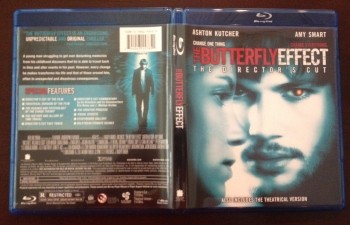 | 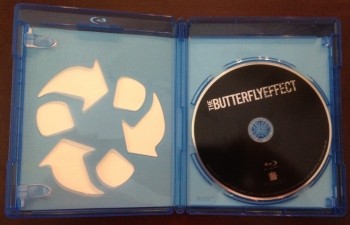 |
The Butterfly Effect arrives from New Line Home Entertainment in a single-disc, standard Blu-ray presentation, with both the Theatrical Cut and the Director's Cut piled onto the same disc. The key difference between the two lies in the conclusion, and it's quite clear that the darker, more unsettling ending of the director's cut remains the filmmakers' objective from the moment we first read the Chaos Theory quote at the movie's beginning. Still, for those who favor the theatrical ending, it's a plus to have both made available, and without a compromise in quality.
Video and Audio:
New Line Home Video were beaten to the punch by Canada's Alliance Films in releasing a Blu-ray of The Butterfly Effect, so it's up to WB's sister label to best that previous high-definition presentation. It does, but not so much in the visual department: the 1.78:1 1080p treatment shares a lot of similarities to its Canadian counterpart in presenting the high-contrast, intensely-manipulated palette, barely edging it out in refinement, color confidence, and fine detail. Heaviness permeates the film's style that makes it tough to pinpoint what's intentional from scene to scene, but all the home-video presentations share elements -- some hazy dream-like scenes, muddy grain, and punchy contrast -- that have been preserved in this HD presentation. Some scenes sport impressive details and vibrant color, others are muddled and flat, but it feels appropriate in terms of its aesthetic. The advancements mostly stem from a finicky technical standpoint; less compression noise and a more fluid representation of contours wins the day, while the master itself, albeit a shade darker than the Canadian release, sports less overall damage.
The real treat comes in the audio. New Line Home Entertainment sprinted beyond the previous sonic presentations of The Butterfly Effect with an aggressive 6-channel Master Audio track. The key sound advancement can be heard in the loud, furious transitions between the real world and Evan's memories; vigorous, punchy activity rumbles during the ferocious thrust of bass and middle-range fervor during those slips of consciousness, while the shaking and rattling of Evan's environments while he's reading his journal really telegraph a punch. Sputtering fire, the slamming of jail cell doors, the clank of a wooden spoon on a metal bowl and even the movement of ice in a glass of liquor also achieve heightened clarity and a natural awareness of the soundstage's threshold. Even verbal clarity receives a significant boost, ridding itself of any thin or metallic-sounding effects that could hamper it. Aside from a few mediocre sound elements feeling slightly muffled, it's a solid, impressive aural presentation from New Line.
Special Features:
New Line Home Entertainment have repurposed most of the special features from the Infinifilm DVD presentation of The Butterfly Effect for this release, a somewhat substantial slate of features that focuses on both the film's theorization and the creative process in getting the film made. Front and center, we've got the Director's Cut Commentary with Bress and Gruber, which hits on the difficulties of getting their film made and how the home-video format has made it possible for them to bring their full vision to their audience. They discuss photographic techniques used that hearken back to Hitchcock, the audition process in finding the right "insane" young Evan, and tons of easter eggs scattered across the film: Eric Stoltz' wig, Kutcher handling worms, and other fun movie-making buts. And, of course, they discuss their original ending, which is where the filmmakers reveal a sense of relief and pride. In addition to that, the subtitle-driven Fact Track has also been preserved for this release.
Alongside those tracks, we've also got a handful of featurettes in the Beyond the Film section of the disc. Two of the pieces focus on the theories and science present in The Butterfly Effect: The Science and Psychology of the Chaos Theory (8:57, SD) and The History and Allure of Time Travel (13:23, SD), both of which offer brief but insightful glimpses into the concept's general basis in conjecture. The other two takes us deeper into the filmmakers' workspace; The Creative Process (17:47, SD) offers a behind-the-camera look at how Bress and Gruber conceived and executed their production, while Behind the F/X (16:04, SD) reveals how both bold and sly digital effects slip into the picture. Fleshing out the rest of the film-centric features, we've also got twelve Storyboard sequences and a slate of Deleted Scenes with Optional Commentary (6:33, SD), several of which are additional alternate takes on the theatrical ending. Finally, we've got a fairly spoiler-heavy but intriguing Theatrical Trailer (2:33, HD).
Final Thoughts:
Eric Bress and J. Mackye Gruber had to fight tooth-and-nail to get The Butterfly Effect made, but ultimately their diligence paid off by constructing this complicated, fast-moving psychological fantasy-thriller about one man's drive to alter his tumultuous past. Barring some meager emotional development in the drama-centered portions of Evan Treborn's life, the concept of fate spiraling out of control when it's manipulated creates an exhilarating space for Twilight Zone-caliber suspense and dystopian eeriness. It provokes a few questions of the audience as well, mostly about the futility of attempting to change one's fate, but it's best to absorb the momentum and bizarre, breakneck shifts in reality than to contemplate the feasibility too closely. New Line Home Entertainment's Blu-ray presentation dishes out a respectable visual transfer and a shocking hard-hitting aural track, all while preserving the commentary, deleted scenes, and featurettes from the original DVD. Very strongly Recommended, and a no-brainer at the low entry price.
|
| Popular Reviews |
| Sponsored Links |
|
|
| Sponsored Links |
|
|
| Release List | Reviews | Shop | Newsletter | Forum | DVD Giveaways | Blu-Ray | Advertise |
|
Copyright 2024 DVDTalk.com All Rights Reserved. Legal Info, Privacy Policy, Terms of Use,
Manage Preferences,
Your Privacy Choices | |||||||









